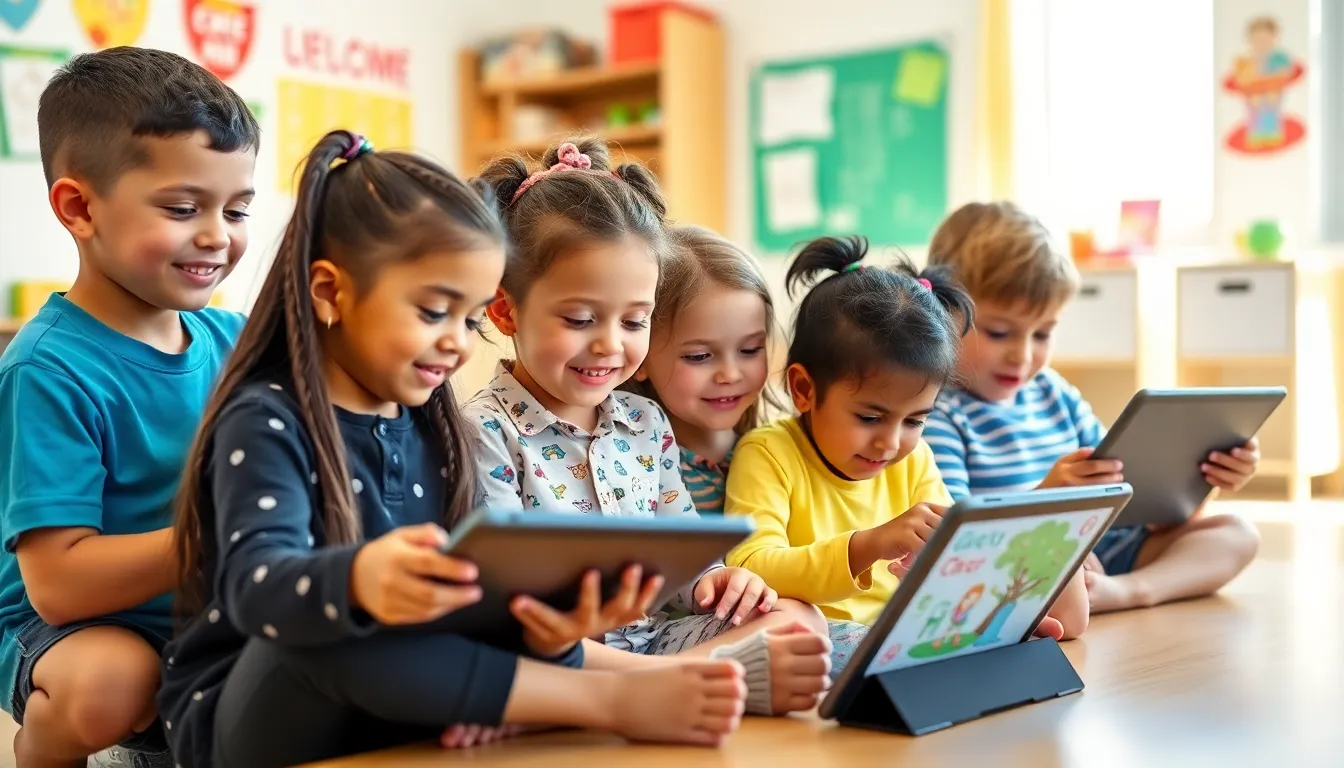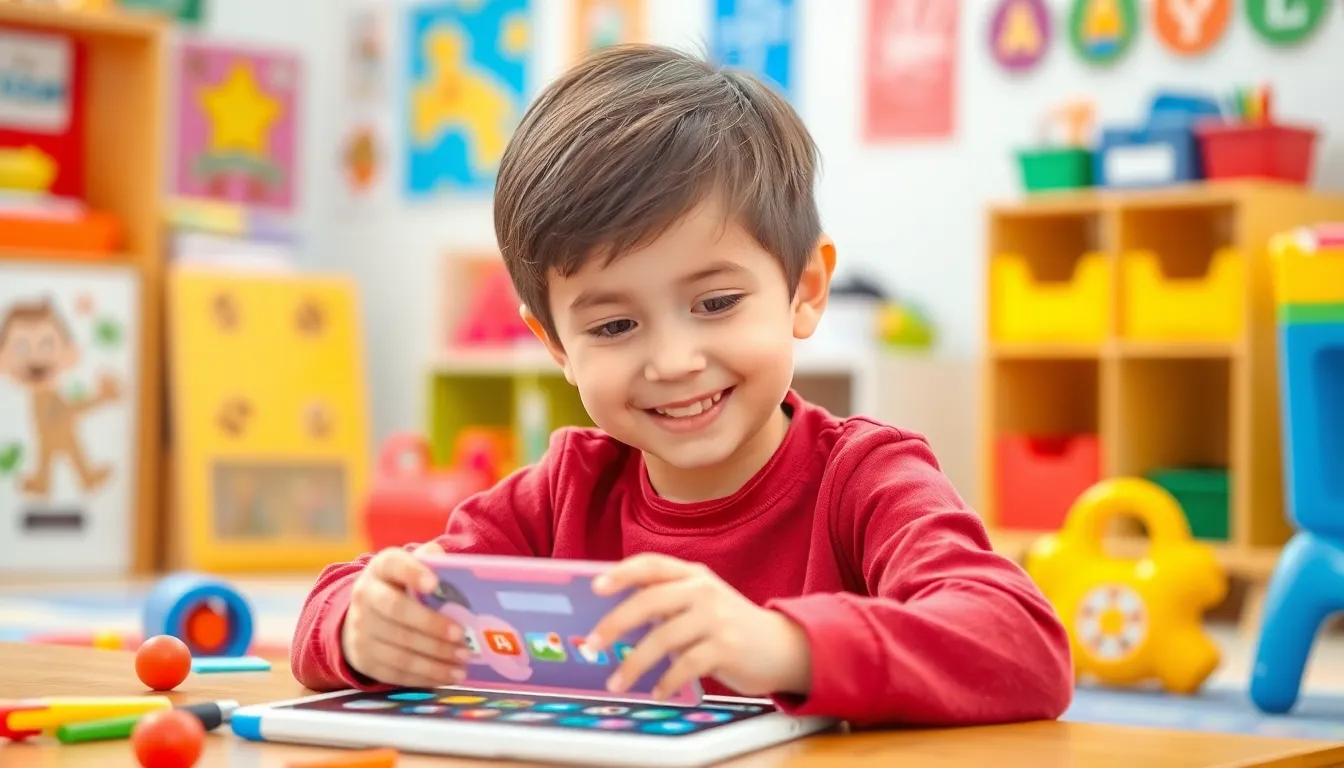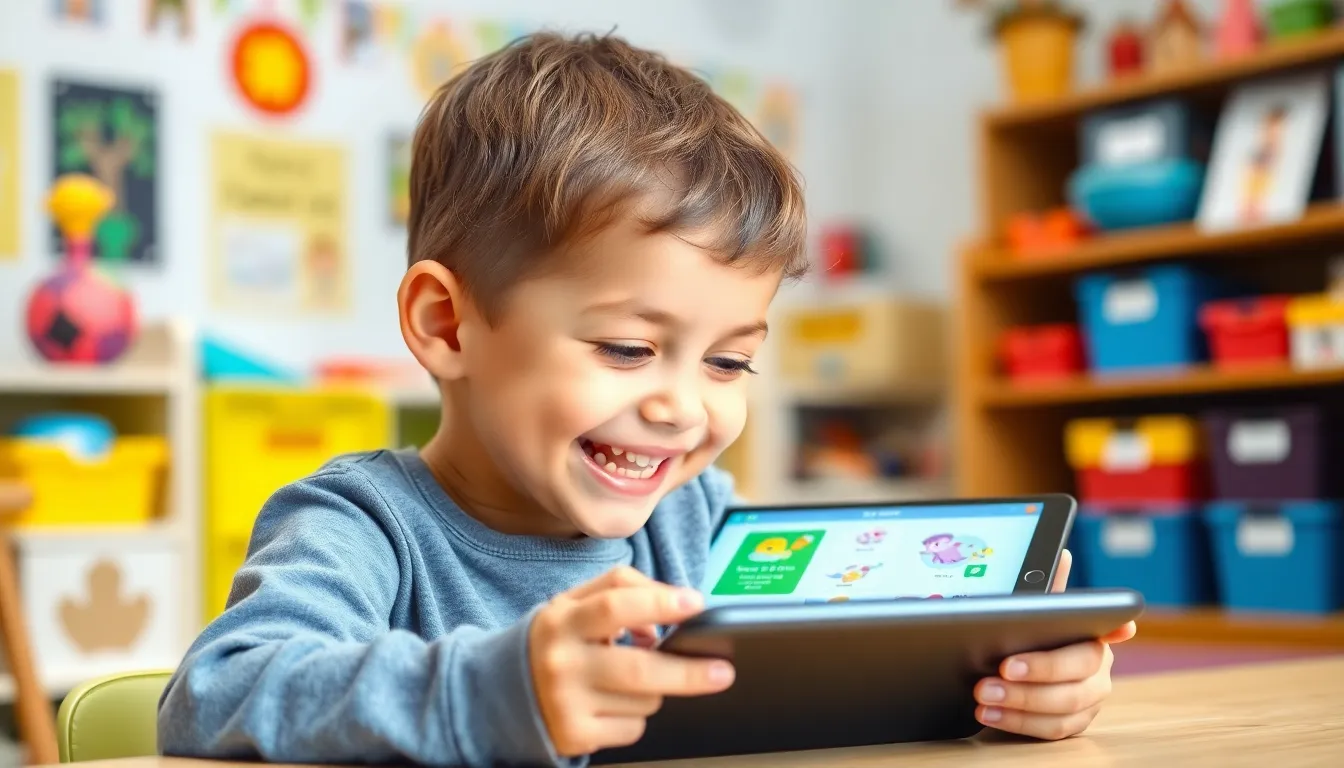In today’s tech-savvy world, learning doesn’t just happen in the classroom. With a tap and a swipe, kindergarteners can embark on educational adventures right from their parents’ devices. Educational apps are like magic portals, transforming mundane lessons into interactive experiences that keep little ones engaged and eager to learn.
Table of Contents
ToggleBenefits Of Educational Apps For Kindergarten
Educational apps significantly enhance the learning journey for kindergarteners. These digital tools provide access to interactive content that can improve understanding in various subjects.
Enhanced Learning Experience
Personalized learning allows children to progress at their own pace. Setting goals encourages them to reach milestones tailored to their abilities. Visual and auditory elements support different learning styles, making educational concepts easier to grasp. Analytics from these apps help parents and teachers track progress effectively. The interactive nature of apps fosters a sense of achievement, reinforcing knowledge retention through engaging activities.
Engagement Through Interactivity
Interactive features capture children’s attention and interest. Touch-based activities invite hands-on exploration, keeping kids involved in the learning process. Immediate feedback drives motivation, ensuring children stay engaged with tasks. Game-based learning introduces competition and fun, turning education into an enjoyable experience. Collaborative features enable social interaction, allowing children to learn with peers and develop communication skills.
Popular Educational Apps For Kindergarten


Several educational apps for kindergarten provide engaging experiences tailored for young learners. These platforms encourage exploration while building essential skills in various subjects.
App Reviews And Features
“ABCmouse” stands out with its comprehensive curriculum covering reading, math, and science. Interactive games captivate children and maintain their interest. “Endless Alphabet” offers vocabulary-building through fun animations and puzzles. “Starfall” focuses on phonics and reading skills, using songs and stories to enhance learning. “Khan Academy Kids” provides a personalized learning experience, adapting to each child’s level. Hands-on activities in “Montessori Numbers” help children grasp mathematical concepts effectively.
User Feedback And Ratings
Ratings for these apps reflect high satisfaction among parents and educators. “ABCmouse” typically receives praise for its structured learning path, with many parents noting significant progress in their children’s reading abilities. Users commend “Endless Alphabet” for its engaging content, often highlighting how children stay motivated. Feedback for “Starfall” indicates effectiveness in phonics, with children showing improvement in reading fluency. Ratings for “Khan Academy Kids” tend to emphasize adaptability, while “Montessori Numbers” gathers positive remarks for encouraging a solid understanding of numbers.
Choosing The Right Educational Apps
Selecting educational apps for kindergarteners requires careful consideration of several key factors. Parents and educators should prioritize age-appropriate content to ensure the app aligns with a child’s developmental stage.
Age Appropriateness
Age-appropriate apps target specific developmental milestones and abilities. Apps designed for kindergarteners often feature engaging visuals and simple navigation, facilitating ease of use. Content should match the cognitive levels of young learners; it often encompasses basic alphabet recognition, counting, and shape identification. Features such as colorful graphics and interactive elements capture attention, promoting longer engagement periods. Accessibility is crucial, allowing children to explore independently while building confidence in their skills. Overall, the best apps offer stimulating experiences that resonate with the interests and capabilities of kindergarteners.
Learning Objectives Alignment
Learning objectives align closely with educational standards, enhancing relevancy and effectiveness. Each app should clearly define goals, such as improving literacy, numeracy, or problem-solving skills. Incorporating features that adapt to individual learning paces supports targeted skill mastery. Regular updates based on educational research ensure that content remains current and effective. Feedback mechanisms play a vital role in understanding a child’s progress, helping parents and teachers adjust learning strategies as needed. Ultimately, aligned learning objectives provide a foundation that fosters measurable educational growth.
Tips For Using Educational Apps
Utilizing educational apps effectively can significantly enhance a child’s learning experience. These tips guide parents and educators in maximizing app benefits.
Setting Time Limits
Establishing time limits ensures balanced screen time. Children benefit from engaging with apps for no more than 30 minutes daily. Break sessions into shorter periods to maintain focus and prevent fatigue. Incorporating breaks during use refreshes attention. It’s essential to introduce offline activities alongside app usage, promoting a well-rounded learning approach. Monitor progress to adjust usage based on engagement and interest level. Structured time helps children transition smoothly between app learning and other educational activities.
Encouraging Parental Involvement
Involvement from parents enhances the effectiveness of educational apps. Engaging in a child’s app sessions fosters a supportive learning environment. Ask questions about tasks completed in the app to stimulate discussion and interest. Establishing routines for app use encourages consistency in learning. Sharing app experiences with children strengthens their understanding and retention of concepts. Attend app-related activities, reinforcing lessons learned in a social setting. Connecting app content with real-life scenarios enhances practical application and comprehension.
Educational apps are revolutionizing the way kindergarteners learn by making education engaging and interactive. These tools not only cater to various learning styles but also promote independent exploration and skill development. With a plethora of options available parents and educators can find apps that align with developmental milestones and educational standards.
Choosing the right app is essential for maximizing its benefits. By actively participating in their child’s learning journey and connecting app content to real-life experiences parents can enhance understanding and retention. Overall the integration of educational apps into early education is paving the way for a more dynamic and effective learning environment.








